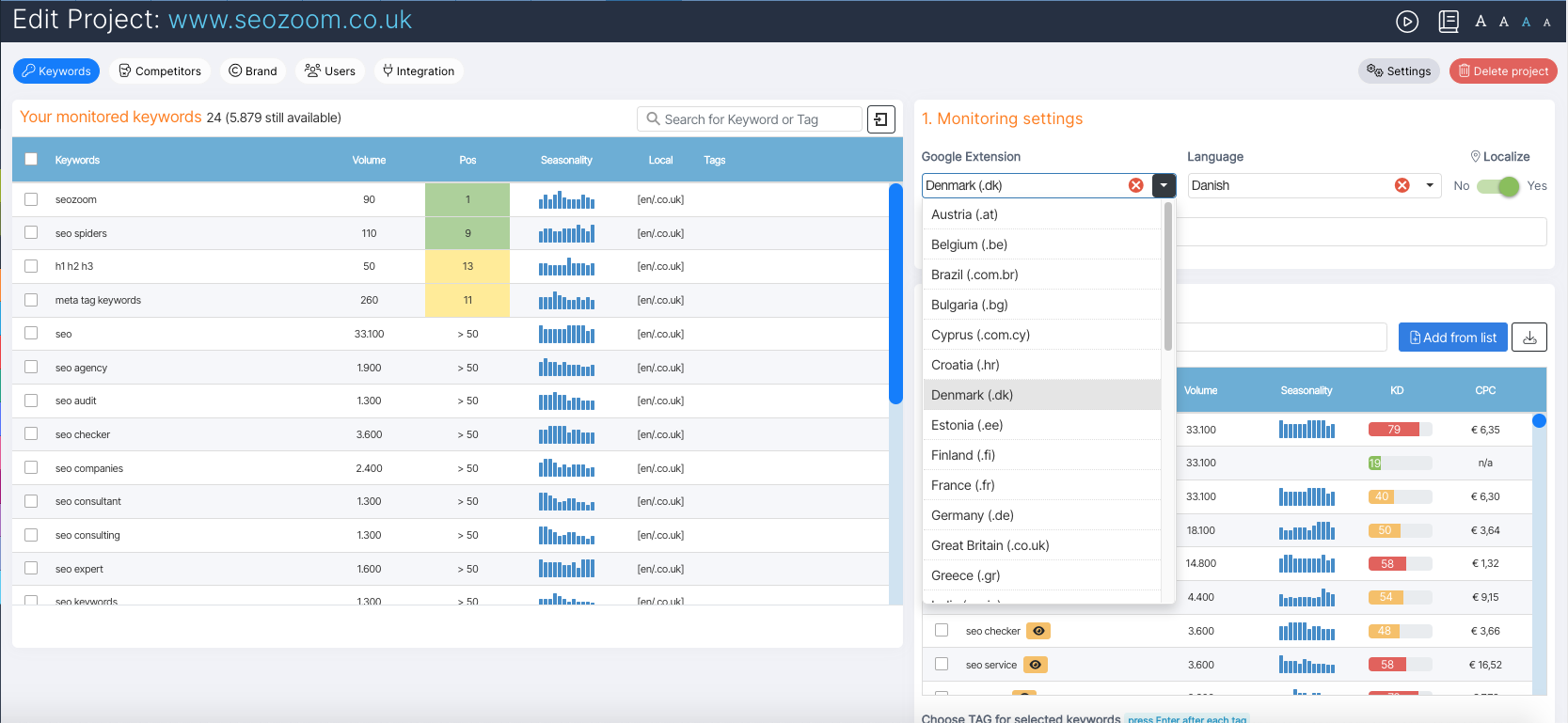SEOZoom rank tracker tools to analyze keywords and sites
Rank tracking is one of the main activities to be performed in SEO and, more generally, in any activity related to an online project, and it is easy to understand why. In fact, keeping track of the changes in the most relevant keywords and the behavior of one’s site in the SERPs means understanding what are the strengths and weaknesses of a site and offers the possibility of being able to intervene to correct the course. Especially those who work in the world of SEO are practically forced to monitor the keywords of a project in order to know what results the content occupies in search engine rankings and check any progress made thanks to the techniques and solutions implemented. If we have the goal of increasing visits to our e-Commerce site or blog, in short, we cannot stop at writing quality content – or, even worse, to work without a structure – but we must follow up on the work by using SEO tools to perform these analyses, such as SEOZoom’s rank tracker features that allow us to monitor keywords and their performance.
What is a rank tracker
Translating from English, a rank tracker is simply a tool for keeping track of ranking, and thus, in specific reference to our business sector, a tool for monitoring the ranking of keywords on search engines, studying their performance, distribution, changes over time, and so on.
Ranking tracking is thus the practice of tracking the placement of URLs in search engine results pages for specific keywords over time, so as to detect trends and see the impact of SEO optimization.
How rank trackers work
There are a number of online tools available on the Web that help monitor site rankings for specific target keywords in a search engine, designed to facilitate tracking through quickly updated and easy-to-understand performance data.
In fact, rank tracker tools manage to perform position analysis in real time or with really low time lag compared to the reality shown by search engines, and they offer interfaces that must be simple, reliable and understandable to speed up operations and allow even those without special skills or experience to understand where and how to intervene to optimize online strategies, increase profits and foster business growth.
The use of this SEO tool allows us to simplify the work of monitoring the performance of our sites, business target keywords and, no less important, the performance of competitors, so as to support SWOT analysis and content strategy.
Why you need a rank tracker tool
For many it may be an obvious platitude, but perhaps those who are new to the job of managing a site may not be clear on one aspect: simply typing target keywords into Google to see where the pages of our site are located is a route that does not offer accurate results. Since 2005, in fact, Google has been rolling out a custom search, and so when we do searches on Search the results are influenced by history, geographic location, and other elements-and even anonymous search may not be the most accurate solution.
It follows that the only accurate way to get ranking data from search engines is to use a rank tracking platform, which are designed to enable this monitoring regardless of subjective factors such as geolocation.
What is rank tracking good for in SEO
It is probably a sentence that has been read a million times, but if the goal of any online project is to maximize profits, the road inevitably also passes by analyzing the performance of the content produced in terms of Google rankings. That is to say, the “mere” creation of quality articles and content does not ensure good performance, if then the search engine still does not “see” them and, consequently, does not bring traffic and visits to the site, blog and eCommerce.
In short, it is essential to know the elements of SEO rankings and to know how to evaluate factors such as keyword tracking within organic search results or Google ranking history in order to have winning projects, and fortunately there is no shortage of support to accomplish these activities.
Especially for SEO professionals, a rank tracker tool is essential: knowing how a website ranks and how its rankings have developed over time helps to understand what strategies can be used to increase both rankings and organic traffic, for example, and there are also other useful insights that can serve to improve the work.
In particular, with rank tracking it is possible to:
- Check the performance of content. The data can help us create relevant content, staying in the wake of content that has gotten the most likes from Google and readers, so we can try to drive even more online traffic to the site.
- Check for declines in traffic. The information from rank trackers can serve us to diagnose sudden traffic losses or downward trend of our pages, identifying the URLs in trouble, and then initiate the analysis of the causes of declining organic traffic and the resolution of the problem.
- Monitor competitors. The tools allow us to see where a direct competitor is ranked, to analyze not only the context of the market in which we operate, but also the level of search engine competition there is for each selected keyword. Understanding what makes competitor marketing campaigns successful is an important step in starting any SEO campaign, just as it is useful to identify untapped opportunities through the use of content gap analysis tools, for example.
- Identify new potential opportunities. In addition to allowing tracking of current keywords, tools can also serve to identify new ranking opportunities and search terms to focus on in the future. For example, if we have web pages ranked on the second page of SERPs for specific search terms, we can intervene with content optimization to increase the likelihood of those pages moving to the first page.
- Support reporting to clients. Data on the performance of strategic keywords can be used for SEO reporting to clients, to demonstrate how (and how much) SEO activities are increasing rankings and impacting sales or leads.
What are rank tracker tools
There are plenty of rank tracker tools online, available both free and paid.
Before we dwell on SEOZoom, which provides several tools to know and have under control everything that is happening to keyword rankings, we pause with a small parenthesis on the other useful rank checker tools, which are now popping up almost like mushrooms: in fact, everywhere you can find platforms that allow (or at least promise) SEO ranking check on search engines, but frequently these are limited or rather simplistic services.
One “unavoidable” reference is the Google Search Console, which we know is a free platform with which Google provides valuable ranking data, with various reports that inform on elements such as clicks, impressions, CTR and average position. The Search Console was created as a package of utilities to support publishers and developers to improve the structure of the site, the way the site appears in Google Search and the quality of the user experience on the site, and is therefore a platform to monitor and manage in a simple and comprehensive way the online project, to get up-to-date information on the performance of the content within the search engines, to find out the queries on which the site is ranking and to have an effective analysis of its data, proposed, however, in a non-comprehensive and raw form.
And then there are the paid rank tracker tools, which usually provide more granular data and are designed to provide usable insights through more specific features. In fact, the classic position tracking tool often lacks Google position history, which is instead a plusvalue of keyword rank tracker tools.
SEOZoom’s rank tracking tools
SEOZoom has never been a platform geared toward simple rank tracking, in fact, and all the tools in the suite-since its launch-have always aimed to broaden the analysis beyond mere ranking data, providing information, metrics, and insights for a more detailed overview of the state of our site and the strategies that can serve to achieve better results than those available on other SEO rank trackers.
With an ambition supported by facts we can consider SEOZoom much more a classic tool for tracking keywords and their performance on Google. Not least because, wanting to mention just one of the advantages of SEOZoom’s rank tracker, it is possible to perform analysis not only on individual keywords, but also more generally on the domain, individual URLs and pages, thus uncovering all the useful details to optimize the strategy. With the expansion to international markets, starting with the monitoring of UK SERPs, it is then possible to use the SZ rank tracker also in a multilingual version, simply by selecting the flag of interest, linked to the language and related search engines.
Using SEOZoom as a rank tracker
More specifically, we can use the keyword rank tracking feature, which simply tells us the position of keywords within the SERPs and the changes in ranking: in this way we have at our disposal a valuable ally that keeps track of everything that happens to our keywords, and read the data to decide where to intervene to improve the positions of our project.
Using SEOZoom as a simple “rank tracker” allows us, as mentioned above, to track the keywords we choose in all languages and on all international versions of Google: to do so, we just need to access the project, go to edit and set up keyword tracking according to the parameters we need, selecting the Google extension on which we want to focus the analysis and the relevant language. Compared to the full information of regular monitoring, however, in this case we will only get the ranking value of the keywords entered and not the exact search volumes, which are only available for SEOZoom’s international databases.
Also in this area, then, we can also set the monitoring of a keyword on a local basis, which is useful for queries strongly influenced by the user’s location: in fact, as a base, SEOZoom analyzes SERPs by setting Italy as the location, but in some cases you may need a more precise geolocation to really find out what the performance of the site and pages is compared to competitors in the area.
In order to always offer accurate and reliable data, SEOZoom’s rank tracker relies on position and variation tracking that is done on a daily basis so you get a quicker view of how keyword positions change over time, with a more detailed rank tracking graph.




